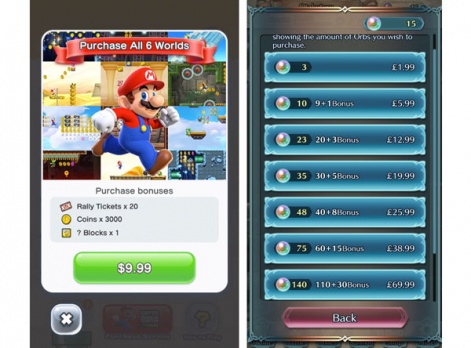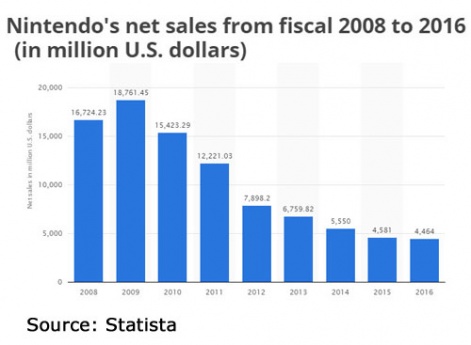Trying to decipher the direction of Nintendo’s business in recent years has become as subjective as telling fortunes by looking at tea leaves.
We can all agree the cup and leaves exist: Nintendo has launched Switch and released Super Mario Run and Fire Emblem Heroes.
But everything else - future and indeed current levels of success and failure - are down to interpretation.
A lack of transparency from Nintendo isn’t helping matters, either. The recent article from Nikkei Asian Review is a classic example.
It quotes Nintendo president Tatsumi Kimishima as saying revenue from Super Mario Run hasn’t met the company’s expectations.
Recently launched on Android, the game, which has a maximum IAP of $10, is thought to have generated over $50 million on iOS, although it’s unclear over what period of time. Any formal statement of revenue won’t be made until Nintendo’s next quarter is announced on April 27th.
Revenue from Super Mario Run apparently did not meet expectations.
Yet the article also quotes an unnamed senior company official as saying Nintendo prefers the ‘free-to-start’ Super Mario Run model to that of the ‘free-to-play’ Fire Emblem Heroes, despite the latter being a top 20 top grossing game in Japan.
They labelled Fire Emblem Heroes "an outlier".
Contrary opinions
Now, these two statements aren’t 100% opposed.
Despite the fact Fire Emblem Heroes has performed well in Japan to-date - it’s also still a top 100 top grossing game in the US and top 30 in Canada - culturally Nintendo doesn’t like F2P monetisation or game design.
It prefers to offer players immediately enjoyable gameplay, not psychologically exciting meta-gameplay.
It could even be argued that due to the limited scope of its monetisation, Fire Emblem Heroes isn’t really a fully fledged F2P game.
Yet, the problem for Nintendo is what it prefers doesn’t chime with what the mobile gaming audience wants, at least in terms of what the paying mobile gaming audience are prepared to spend money on.

Of course, a disconnect between what consumers want and what a company wants to offer them is a well worn debate.
Henry Ford’s much quoted (but apocryphal) quote about “faster horses” or Steve Jobs disdain for “focus groups” set the scene.
Nintendo rarely follows market trends.
And Nintendo’s biggest successes have come from offering gamers something new and innovative (DS and Wii), while its biggest failures have come from offering gamers something new and innovative (the 3D element of 3DS and Wii U).
Nintendo rarely follows market trends.
Halting a long decline
Yet for all its otherness, Nintendo does operate under the same financial constraints as any other company.
Its sales have been in decline since the DS-Wii peak years of 2009. Indeed, its 2016 annual revenues of $4.5 billion were down 76% compared to 2009’s $18.8 billion.
In that context, some will suggest beggars can’t be choosers.
Working together with mobile partner DeNA, Nintendo now needs to base its mobile game strategy on current market conditions and then sprinkle its magical dust, rather than assume its magic can persuade more than 5% of downloaders to spend $10 to unlock the rest of Super Mario Run and then complain when it doesn’t.

For whatever you think about Henry Ford and Steve Jobs’ philosophy, the longevity of their success came from listening to their customers. Eventually you could buy non-black Model Ts and 7-inch iPads.
F2P might not be appropriate for its forthcoming Animal Crossing game, but if Nintendo wants to make an impact in the $7 billion Japanese mobile game market, not to mention the $40 billion global mobile game market, it needs to get with the program.
Certainly this is culturally difficult for Nintendo. It goes against almost 35 years of developing games highly optimised for its own hardware. But there is a difference in having a mobile strategy and having a coherent mobile strategy.
At present, my reading of the tea leaves suggests Nintendo has the former, not the latter.
















